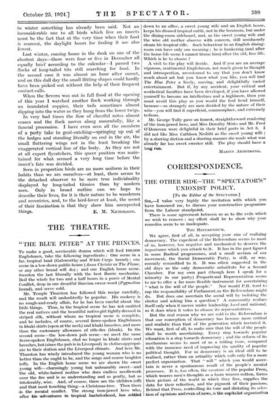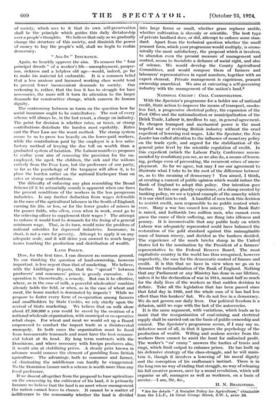CORRESPONDENCE.
THE OTHER SIDE—THE "SPECTATOR'S" UNIONIST POLICY.
[To the Editor of the SrECTATOR.] Snt,—I value very highly the invitation with which you have honoured me, to discuss your constructive programme from the Labour standpoint.
There is some agreement between us as to the evils which we wish to remove : my effort shall be to show why your remedies seem to us inadequate.
THE REFERENDUM.
We agree, first of all, in accepting your aim of realizing democracy. The expedient of the Referendum seems to most of us, however, too negative and mechanical to deserve the importance which you attach to it. It 'has in the past figured in some Radical programmes, and a small section of our movement, the Social Democratic Party, is still, or was, recently committed to it. It was often suggested in the old days as the only democratic substitute for a Second Chamber. For my own part (though here I speak for a minority in our party) Proportional Representation seems to me to offer a far more flexible instrument for ascertaining "what is the will of the people." Nor would P.R. tend to sap the responsibility of Parliament, as the Referendum might do. But does one ascertain the social will by isolating the elector and asking him a question ? A community realizes itself only when it moves under leadership, local and national, as it does when it votes to choose its representatives.
But the real reason why we are cold to the Referendum is that our conception of democracy has become more critical and realistic than that of the generation which invented it. We want, first of all, to make sure that the will of the people -shall be worth ascertaining. Every step towards popular education is a step towards democracy ; and the reform of its mechanism seems to most of us a trilling issue, compared with the immense need of improving the quality of popular political thought. For us democracy is an ideal still to be realized, rather than an actuality which calls only for a more perfect organization. That " will " which you would ascer- . tain is never a spontaneous result of the people's mental processes. It is, too often, the creature of the popular Press, which weaves men's thoughts as a loom weaves cotton, forms their picture of the world in which they live, supplies the data for their reflection, and the pigment of their passions. Behind that Press, controlling its tone and dictating its schen- -tion of opinions and even oLnews, is the capitalist organization
of society, which sees to it that its own self-preservation shall be the principle which guides this daily dictatorship over a people's thoughts. We believe that only as we gradually change the structure of this society, and diminish, the power of money to buy the people's will, shall we begin to realize democracy.
" ALL-IN " INSURANCE.
Again, we heartily approve the aim. To remove the "four principal dreads" of a worker's life—unemployment, pauper- ism, sickness and a helpless old age—would, indeed, go far to make his material lot endurable. It is a common belief that a less anxious and harassed working class would tend to present fewer inconvenient demands to society. Our reckoning is, rather, that the less it has to struggle for bare necessaries, the more will it turn its attention to the larger demands for constructive change, which concern its human dignity.
The controversy between us turns on the question how far social insurance ought to be contributory. The cost of every scheme will always be, in the last resort, a charge on industry. The point for decision is whether rates, or taxes, or stamp contributions distribute the burden most equitably. Rates and the Poor Law are the worst method. The stamp system seems to us to press too heavily on the lower-paid workers, while the contribution paid by the employer is a less satis- factory method of levying the due toll on wealth than a graduated system of taxation. The Labour manifesto proposes to realize your aim of removing the provision for the un- employed, the aged, the children, the sick and the widows entirely from the Poor Law, but the preference of our party, so far as the psychology of the taxpayer will allow it, is to place the burden rather on the national Exchequer than on rates or stamp contributions.
The difficulty of enforcing any plan resembling the Broad Scheme (if it be actuarially sound) is apparent when one faces the present conditions of the workers in the less prosperous industries. Is any further deduction from wages defensible in the case of the agricultural labourer in the South of England, earning his 25s. or less, or for the lower grades of miners in the poorer fields, who often, even when in work, must go to the relieving officer to supplement their wages ? The attempt to enforce it would lead to demands for the fixing of a general minimum wage. That, in its turn, would raise the problem of national subsidies for depressed industries. Insurance, in short, is not.a cure for poverty. Attempt to apply it on any adequate scale, and it will drive you onward to much larger issues touching the production and distribution of wealth.
LAND POLICY.
Here, for the first time, I can discover no common ground. To our thinking the question of land-ownership, however important., is less urgent than that of marketing. We believe, with the Linlithgow Reports, that the " spread " between producers' and consumers' prices is grossly excessive. Co- operation is, theoretically, a remedy. But can it be effective, where, as in the case of milk, a powerful wholesalers' combine already holds the field, or when, as in the case of wheat and meat, the home market is dominated by imports ? While we propose to foster every form of co-operation among farmers and smallholders by State Credits, we rely chiefly upon the revival of State marketing. We believe that on milk alone about 17,500,000 a year could be saved by the creation of a national wholesale organization, with municipal or co-operative retail shops. For wheat and meat we would set up a Board empowered to conduct the import trade as a disinterested Monopoly. In both cases the organization must be freed from bureaucratic trammels and muSt have the best commer- cial talent at its head. By long term contracts with the Dominions, and where necessary with foreign producers also, it would aim at stabilizing prices. A steady price known in advance would remove the element of gambling from British agricniturel The advantage, both to consumer and farmer, of eliminating the middleman can hardly be exaggerated. To the Dominion farmer such a scheme is worth more than any fiscal preference.
If we dissent altogether from the proposal to base agriculture on the ownership by the cultivator of his land, it is primarily because we believe that the land is an asset whose management -the nation cannot leave to chance. , It cannot be a matter of Indifference to the community whether the land is divided
into large farms or small, whether grass replaces arable, whether cultivation is slovenly or scientific. The best type- of private landlord does, or did, attempt to enforce some stan- dard. Apart from the technical question whether the small peasant farm, which your programme would multiply, is econo- mically the most satisfactory, the proposal which it involves, to abandon even the present measure of management and control, seems to Socialists a defiance of social right, and also of science. We would develop the County Agricultural Committees, and would compose them of farmers and labourers' representatives in equal numbers, together with an expert element. Private management is capricious, peasant ownership anarchical. We aim at entrusting a self-governing industry with the management of the nation's land.*
NATIONAL CREDIT: COAL CARBONIZATION.
With the Spectator's programme for a bolder use of national credit, State action to improve the means of transport, smoke- less fuel, a progressive electrical policy, the expansion of the Post Office and the nationalization or municipalization of the Drink Trade, Labour is, needless to say, in general agreement. To cheapen transport and mechanical power is the most hopeful way of reviving British industry without the cruel expedient of lowering real wages. Like the Spectator, the New Leader has called attention to the influence of monetary policy on the trade cycle, and argued for the stabilization of the general price level by the scientific regulation of credit. In this expedient (which the Labour Party Conference recom- mended by resolution) you see, as we also do, a means of lessen- ing, perhaps even of preventing, the recurrent crises of unem- ployment. So far we agree, but may I use our agreement to illustrate what I take to be the root of the difference betweer us, as to the meaning of democracy ? You aimed, I think, at creating a current of public opinion which would induce the Bank of England to adopt this policy. Our intention goes further. In this one ghastly experience, of a slump created by banking policy, we see a typical example of the anarchy which it is our chief aim to end. A handful of men took this decision to restrict credit, men responsible to no public control what- ever. Many a war has caused less misery. The Bank Rate is raised, and forthwith two million men, who cannot even guess the cause of their suffering, are flung into idleness and penury. It is inconceivable that any public body on which Labour was adequately represented could have balanced the restoration of the gold standard against this unimaginable mass of human misery, and decided as the bankers decided. The experience of the much briefer slump in the United States led to the nomination by the President of a farmers' representative to the Federal Reserve Board. The most capitalistic country in the world has thus recognized, however imperfectly, the case for the democratic control of finance and credit. It is this that we have in view when we go on to demand the nationalization of the Bank of England. Nothing that any Parliament or any Ministry has done in our lifetime, unless it be the declaration of war in 1914, meant half so much for the daily lives of the workers as that sudden decision to deflate. Take all the legislation that has been passed since that fatal day in 1920, and the whole sum of it has had leis effect than this bankers' fiat. We do not live in a democracy. We do not govern our daily lives. Our Political freedom is a delusion, until we cope with the last of the autocracies.
It is the same argument, with variations, which leads us to
insist that the reorganization of coal-mining and electrical supply shall be carried out on the basis of public ownership and control. The Spectator's programme seems, if I may say so, defective most of all, in that it ignores the psychology of the production of wealth. Willing and zealous service from the workers there cannot be amid the hunt for unlimited profit. The .worker's "en' canny" answers the tactics of trusts and rings, which limit output to enhance prices. He has built up his defensive strategy of the class-struggle, and he will main- tain it, though it involves a lowering of his moral dignity and the corruption of his craftsman's instinct. There is in the long run no way of ending that struggle, no way of releasing his full creative powers, save by a moral revolution, which will organize us all, managers as well as workmen, on Ei basis of service.—I am, Sir, &c., H. N. BRAILSFORD.
* See for details "A Socialist Policy for Agriculture," obtainable . from the I.L.P., 14 Great George Street, S.W. 1, price 2d.



























































 Previous page
Previous page